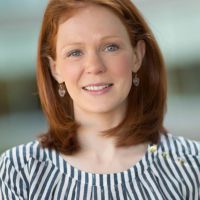Anna Kahkoska and Angela Fruik used community feedback sessions to design a participant-friendly study on diabetes and mental health.
Community feedback: Making diabetes research feasible for participants
Anna Kahkoska and Angela Fruik used community feedback sessions to design a participant-friendly study on diabetes and mental health.
Anna Kahkoska, MD, PhD
Most people don't think twice about their blood sugar levels. That's because, for most people, their body automatically regulates their blood sugar with the hormones insulin and glucagon, helping to keep glucose levels within a normal range after and between meals.
For people with diabetes, however, the process of blood sugar maintenance requires active participation, with no days off. On weekdays and weekends, holidays and vacations—every single day—people with diabetes need to check their blood glucose levels and correct any imbalances, lest they risk a serious health emergency from high or low blood sugar.
Unsurprisingly, this constant need for maintenance can be mentally and emotionally exhausting. And for many people, the long-term pressure to manage their diabetes day in and day out results in what's called "diabetes distress." Diabetes distress is relatively common (according to the American Diabetes Association (ADA); approximately 20% of people with diabetes have severe diabetes distress)—and in some cases, the ADA notes, diabetes distress can even affect a patient's physical health, when "diabetes burnout" causes them to neglect their care routine.
In 2023, Anna Kahkoska, a diabetes researcher at the UNC School of Medicine and Gillings School of Global Public Health, and Angela Fruik, a research project manager at Gillings, kicked off the "ChargeUp" study, a research initiative on diabetes distress funded by the ADA. By building off the growing body of research on the causes and care options for diabetes distress, the two researchers are trying to scale new evidence-based treatments to reduce distress in people with Type 1 diabetes.
But before Kahkoska and Fruik could set about screening for diabetes distress and testing their interventions, they wanted to get some feedback on their study design from people with diabetes themselves. So last year, the researchers held a series of community feedback sessions, facilitated by the Patient and Community Engagement in Research (PaCER) program at the North Carolina Translational and Clinical Sciences (NC TraCS) Institute.
These sessions give researchers a structured and interactive way to gain feedback on their ideas and studies from patients, clinicians, advocates, or others connected to the research at hand. For Fruik and Kahkoska, the goal was to make their study accessible, feasible, comfortable, and valuable to participants—ensuring that participants were engaged and supported as they progressed through each part of the study.
Angela Fruik, MPH, RD, LDN
"We want people to get value out of our study and to feel that they're coming out the other end having learned new skills and feeling positive about their experience," Fruik says. "So, delivering a quality research study that feels organized and accessible to participants was really important to us."
"When a researcher requests NC TraCS' help to facilitate a community feedback session, we'll offer guidance on preparing for the session and create a plan for how to gather feedback," says Simone Frank, senior project manager at PaCER. "Our team will help develop discussion prompts, facilitate the actual session, and take notes on what participants say. And we'll provide a comprehensive follow-up report after the session. These sessions can focus on a variety of communities: patient groups, caregivers, clinicians—and they can go a long way toward helping a research team ensure their work lines up with community needs."
Kahkoska and Fruik designed their ChargeUp study around weekly group meetings—held virtually—with additional, individualized sessions for people who did not find the group meetings to be effective in reducing their diabetes distress. For the first feedback sessions, the ChargeUp team recruited a group of people with Type 1 diabetes and asked them what they thought of this study design. This group was invited to give their two cents on how to make the study accessible and accommodating to the eventual participants.
There's so much value in the exercise of not making assumptions about what our study participants will perceive as helpful...
Some of Kahkoska and Fruik's questions focused on the basic logistics of organizing their study, such as when to meet during the week and when to send reminder messages before meetings. These sorts of details can often make a difference in a participant's satisfaction and enthusiasm with a study, and the research team didn't want to take anything for granted.
"We want to make sure that people aren't forgetting about their session," Fruik says. "We also want to make sure, on the flip side, that we aren't coming across as annoying or over-communicative."
"There's so much value in the exercise of not making assumptions about what our study participants will perceive as helpful versus burdensome, even for these things that seem like small details. They really impact on the overall experience, as well as the outcomes," Kahkoska adds.
Other feedback focused on helping clinicians and study leaders communicate more clearly with patients who may be experiencing distress and who might be eligible for treatment in ChargeUp. For example, the team had developed a script for doctors to use with patients who screened positive for possible diabetes distress—and in the feedback sessions, participants expressed a desire for the script to be shorter and more direct, and they offered suggestions on how to make the script's language as informative and non-stigmatizing as possible.
After these initial feedback sessions, the team then recruited another small group of people with Type 1 diabetes to take part in a pilot version of their study. At the end of the pilot sessions, the team asked them to reflect on the process in another round of community feedback sessions. This time, the questions focused on things like how the participants felt during the group meetings, their interactions with other participants and their facilitator, and ultimately, if the sessions were helpful. These participants could offer some specific feedback on the study process, such as suggesting that the researchers give out a syllabus and timeline at the start of the study to help participants prepare in advance.
Working with the TraCS group was incredible...which informed our decision to change multiple aspects of our study.
The ChargeUp team has now incorporated the feedback they received during these sessions into their final study design—and kicked off that study this past fall. "This is a great example of how impactful community feedback sessions can be during the intervention development and study design phases of a project," Frank says. "In later feedback sessions, some of the most positive comments the team received were about parts of the intervention that had been directly shaped by feedback from those initial sessions."
Kahkoska notes that she's grateful to the people who participated in the community feedback sessions and says participants in these sessions gave incredibly constructive and thoughtful notes. She also notes that the support of experts from NC TraCS was vital to this process.
"Working with the TraCS group was incredible," Kahkoska says. "The regulatory aspects of stakeholder engagement look really different than research, and they helped us navigate that. Their expertise to facilitate these groups also allowed us to take a step back and consider the honest feedback that people had. They also provided us with summaries of each session, which informed our decision to change multiple aspects of our study."
"Planning and facilitating these feedback sessions was really special, thanks to both the session participants and the ChargeUp team. People were so engaged in the conversations and shared such valuable feedback," Frank says. "There was also this sense of excitement around the fact that this intervention was still being built and that the research team was genuinely committed to changing things about the study based on their feedback. It almost felt like peeling back the curtains on what goes into designing a research study."
"I don't think we can overstate the value of what these [feedback sessions] provided to our project," Fruik says. "It increased participation, promoted retention—it just improved the overall participant experience. We feel that this process has helped us improve the research experience for our participants."
Related
NC TraCS is the integrated hub of the NIH Clinical and Translational Science Awards (CTSA) Program at the University of North Carolina at Chapel Hill that combines the research strengths, resources, and opportunities of the UNC-Chapel Hill campus with partner institutions North Carolina State University in Raleigh and North Carolina Agricultural and Technical State University in Greensboro.




